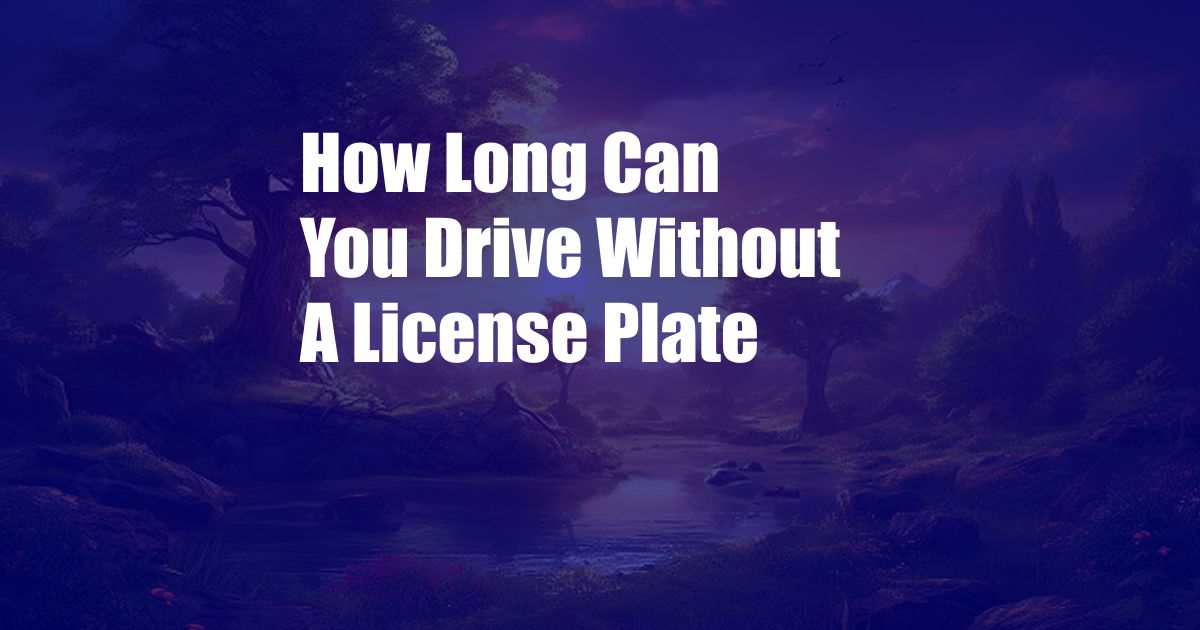
How Long Can You Drive Without a License Plate?
Driving without a license plate is a serious offense that could lead to hefty fines, vehicle impoundment, or even jail time. In most states, it is illegal to operate a motor vehicle without a valid license plate attached to the rear of the vehicle. The absence of a license plate makes it difficult for law enforcement to identify the vehicle and its owner, which can hinder investigations and impede public safety.
The duration for which one can drive without a license plate varies from state to state. In some jurisdictions, you may be allowed to drive for a short period, such as a few days or weeks, before you are required to obtain a new license plate. However, in other states, driving without a license plate is considered a criminal offense punishable by immediate fines or arrest.
Temporary License Plates
Overview
Temporary license plates are paper or cardboard plates that are issued by the Department of Motor Vehicles (DMV) or other authorized agencies. They are valid for a limited period, typically 30 to 90 days, and allow you to drive your vehicle while you wait for your permanent license plates to arrive. Temporary license plates serve as proof that you have registered your vehicle and are legally permitted to operate it.
Obtaining and Using Temporary License Plates
To obtain a temporary license plate, you will need to visit the DMV or an authorized agent with proof of vehicle registration and insurance. A fee may be charged for the issuance of the temporary plate. Once you have obtained the temporary license plate, you must display it prominently on the rear of your vehicle. It is important to note that temporary license plates are not valid for extended periods, and you must replace them with permanent license plates as soon as they arrive.
Consequences of Driving Without a License Plate
Fines and Penalties
The consequences of driving without a license plate can vary depending on state laws and the circumstances of the offense. In general, you can expect to face fines ranging from $50 to several hundred dollars. In some cases, you may also be charged with a misdemeanor or felony offense, which could lead to jail time or loss of driving privileges.
Vehicle Impoundment
In addition to fines, law enforcement may also impound your vehicle if you are caught driving without a license plate. This means that your vehicle will be towed and stored at an impound lot until you can provide proof of valid registration and license plates. You will be responsible for paying towing and storage fees to retrieve your vehicle.
Tips and Expert Advice
Check Your License Plate Regularly
To avoid driving without a license plate, it is important to check your license plate regularly for any damage or loss. If you notice that your license plate has been stolen or damaged, report it to the DMV immediately and obtain a replacement license plate.
Keep a Copy of Your Registration
In case you are stopped by law enforcement and your license plate is missing or damaged, it is helpful to have a copy of your vehicle registration with you. This will provide proof that you have registered your vehicle and are legally permitted to drive it.
FAQs
Q: Can I drive with an expired license plate?
A: No, it is illegal to drive with an expired license plate. You must renew your license plate before the expiration date to avoid fines or penalties.
Q: What should I do if my license plate is stolen?
A: Report the theft to the police immediately and contact the DMV to obtain a replacement license plate.
Q: Can I drive with a temporary license plate indefinitely?
A: No, temporary license plates are valid for a limited period only. You must replace them with permanent license plates as soon as they arrive.
Conclusion
Driving without a license plate is a serious offense that can lead to significant consequences, including fines, vehicle impoundment, and even jail time. It is important to be aware of the laws in your state regarding license plates and to take steps to ensure that your vehicle is always properly registered and displaying a valid license plate.
Remember, driving without a license plate not only puts you at risk of legal penalties but also poses a safety hazard. It makes it difficult for law enforcement to identify your vehicle and contact you in case of an emergency. By following the tips and advice outlined in this article, you can ensure that your vehicle is legally compliant and that you are driving safely and responsibly.
Are you interested in learning more about the consequences of driving without a license plate or have any other questions? Share your thoughts and experiences in the comments below.